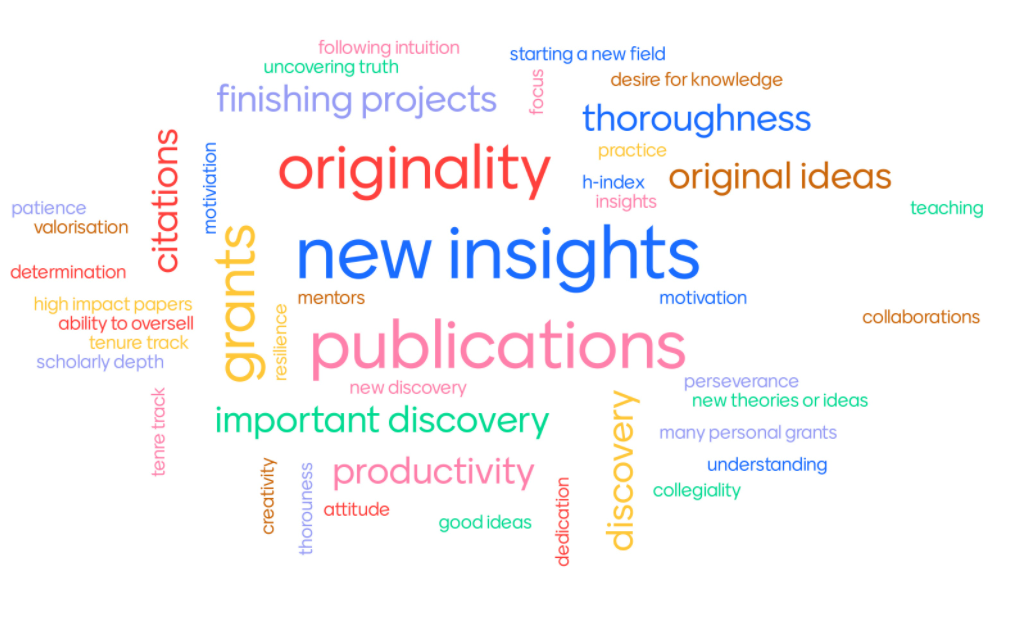This post is also available in Dutch .
Could excellence be achieved easily? Does being excellent require talent and countless hours of hard work? In an interactive discussion at the Donders Institute on March 4th, 40 scientists, including professors and junior researchers, discussed the possibility of making excellence ordinary.
Excellence may be mundane
Inspired by a paper titled “The Mundanity of Excellence,” which received lots of attention recently on Twitter, three PhD candidates (Iva Ilioska, Ping Chen, and Cagatay Demirel) presented and summarized the main message of the paper with the following points:
- It doesn’t take a genius. The author of the original paper, Chambliss, studied world-class swimmers for years to identify the main factors that differentiate top athletes from average athletes. Surprisingly, Chambliss found that no single characteristic or personality trait determines success. In other words, exceptional talent is not always necessary.
- Quality matters much more than quantity. While quantity is about repeating the same task many times, quality involves doing the task differently or smartly. Take swimming as an example; one might think that top swimmers must soak in the pool all day, training hard. Most excellent swimmers trained only limited hours per day, but each day they were motivated, focused on achievable goals (e.g., perfecting their backstroke), and then went home with satisfaction. They found the simplest move (e.g., swimming back and forth) enjoyable, meditative, and even therapeutic.
- An ordinary path. If both excellence and motivation are ordinary, then what is the secret? According to Chambliss, “There is nothing extraordinary or superhuman. Superlative performance is really a confluence of dozens of small skills carefully drilled into habit and then fitted together in a synthesized whole.”
What is excellence in academia?
Next, the audience members joined an interactive session where they entered 3 key words that reflect their opinion towards being excellent in academia. Results were shown in word clouds, where the size of a word is larger the more it is mentioned.
“What is excellence in academia?” In the word cloud below, “new insights” showed up on top of everything else. The next obvious words are “originality,” “publications,” and “grants.” The latter two words somehow reflected pressure in academia just like any other career. There are also words like “thoroughness,” “discovery,” “citation,” “productivity” as well as “the ability to oversell,” suggesting diversity in opinions of different scientists even in similar research fields.

“What habits/skills must an excellent scientist have?” In the answer below, “resilience” received the most attention, and there were also frequent words like “independence,” “determination,” “perseverance,” “focus,” and “have fun”. Words about communicating in science are the next significant entries: “listen to others,” “social support,” “read broadly,” and “openness to feedback.”

A contrasting idea about the mundanity of excellence in academia
In the follow-up discussion, participants were encouraged to give their own opinions freely. While most people agreed with the idea that excellence could be mundane, a few people held a different view that being an excellent scientist requires much creativity and originality. For example, Noble prizes often go to groundbreaking findings. This contrasts with the paper we talked about in terms of mundanity. On the other hand, the Chambliss article suggests that the things that seem out of the ordinary, like creativity and new insights, may be cultivated by sticking to positive, but ordinary habits over a long period of time.
Author: Ping Chen
Buddy: Marisha Manahova
Editor: Rebecca Calcott
Translation: Ellen Lommerse
Editor translation: Jill Naaijen
Cover Image by Clay Banks on Unsplash; Word cloud generated using Mentimeter
